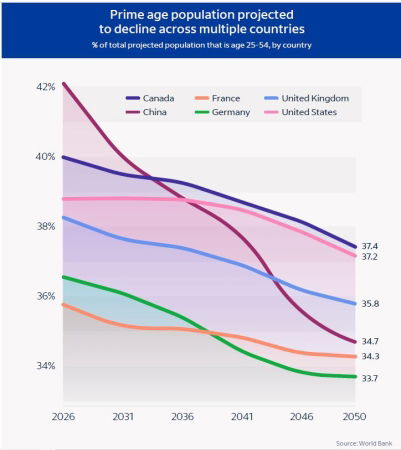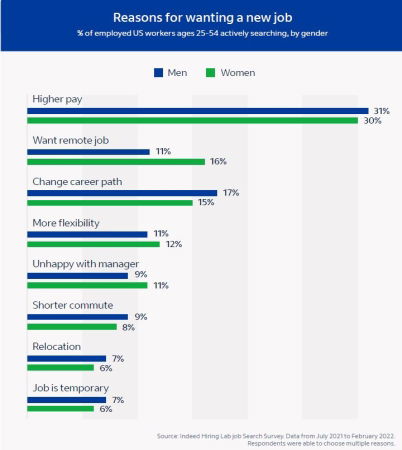share on
Not only will hiring be more difficult, but workers will have more power to demand changes. The principal reason for this can be summed up in one word: demographics.
Five trends of the modern workplace are expected to reshape the labour market in the long-term, according to Indeed and Glassdoor economists, who have come up with the 2023 Hiring & Workplace Trends Report.
#1: Labour supply issues likely to persist in the long run
While some of us may have thought hiring difficulties will evaporate as COVID recedes, it's becoming evident that deep-seated and long-term supply dynamics will continue to create a persistent gap between employer demand for new hires and the supply of candidates. Not only will hiring be more difficult, but workers will have more power to demand changes. The principal reason for this can be summed up in one word: demographics. Over the next decade, the number of people of working age (between 15 and 65), will decline in a variety of countries, according to World Bank projections.

Things for recruiters to think about:
- Immigration: Attracting workers from abroad is an effective way to promote hiring in tight labour markets. National policies that allow immigrants quick access to employment widen avenues for recruitment. Even Japan, known for strict immigration limits, has eased visa requirements for certain categories of workers.
- Overlooked pools of workers: Most countries have laws prohibiting discrimination against disabled people, but employers can do more to accommodate these workers by adopting flexible work policies. Flexibility in areas such as work scheduling is key to attracting and retaining older demographics as well as women.
- Investing in productivity-enhancing technology: Replacing workers with machines has been controversial since the debate over automation decades ago. However, data shows, though, that technological advances can boost productivity without pushing up joblessness.
#2: Remote work will continue to thrive in occupations where it is an option
The acute need to work from home has ended, yet the ability and option to work from anywhere is thriving. Searches for remote work remain popular with job seekers. However, there will always be a large number of jobs that are not compatible with remote work. It’s estimated that only about a third of occupations are suitable for remote work. Burgers can’t be flipped, trucks can’t be driven, and surgery can’t be performed from home offices. Employers trying to fill in-person jobs may find themselves at a disadvantage as workers gravitate toward work that lets them stay home.

Things for recruiters to think about:
- In-person employers are responding by offering signing bonuses relatively more heavily than their counterparts recruiting for remote-friendly occupations.
- The long-term impacts of remote work are yet to be determined, or fully felt. Remote work could intensify economic inequality and gender roles (women seek remote jobs at higher rates than men). At the same time, remote work eliminates the commute, which has allowed workers with disabilities to find and maintain employment.
- Remote work has the potential to create much more diversity in the workforce. It is imperative employers continue to monitor and adjust their policies to ensure the inclusivity, equity, and diversity of their workforce.
#3: The benefits employees prioritise are shifting, with inflation playing a key role
Please note, that most of the data presented in section pertains to US-based analysis, although some that HRO has highlighted may apply regionally. Widespread wage gains and inflation are likely both influencing job seekers’ expectations toward higher dollar amounts. Indeed's employment ads have seen a climb in three major benefit categories—healthcare, retirement, and paid time off —across the US labour market. The rise has been most pronounced in sectors where employers have been scrambling for workers, and many of those jobs pay lower wages and require in-person attendance at a worksite.

Things for recruiters to think about:
- Stocked kitchens and free lunches, according to Glassdoor's analysis, are on the rise in perhaps unexpected corners of the economy, like manufacturing and transportation/logistics. Meanwhile, fewer employees are reporting free lunch or snacks at technology companies. For these workers, free lunches and snacks used to be an incentive to work longer hours; now they are an incentive to come into the office at all.
- Access to commuter benefits grew in many of the industries that do not have a remote work option. These benefits could include free parking, public transportation reimbursement, and even money for gas.
- Perhaps the most critical benefit that seems to be growing across all industries is mental health care.
#4: A culture of happiness and wellbeing can help attract and retain employees
While salary and benefits remain top of mind for employees, creating a positive company culture is a key area that employers can use to further distinguish themselves, especially in the face of remote work. With more choices for workers thanks to a smaller labour pool, employees are demanding greater wellbeing in their experience at work, including increased levels of happiness, satisfaction, purpose, and manageable stress.
#5: Diversity, equity, and inclusion (DEI) are pushed to the forefront
The researchers find there is a generational divide when it comes to attitudes toward DEI—and as older workers vacated jobs during the pandemic, their younger counterparts find themselves in a position to demand more when it comes to social justice. A September 2022 survey from Indeed & Glassdoor showed that age and generation—more so than gender, race/ethnicity, geography, sexual orientation, or parental status—determine whether someone believes DEI is important in the workplace. The share of Glassdoor benefit reviews indicating that a company offered a DEI programme—benefits such as employee resource groups, diversity training, and mentoring programmes—surged in 2020 and 2021 in the US, Canada, and the UK.
On the findings, Svenja Gudell, Indeed Chief Economist commented: "Together, they (the five trends) paint a clear picture: Looking past any near-term business cycle shifts, hiring will remain challenging for years to come driven by demographics and evolving preferences."
Aaron Terrazas, Glassdoor Chief Economist, added: "The past two years have pushed people leaders to the forefront of their organisations as executive teams around the world grapple with how to motivate and retain teams in a quickly-changing and increasingly volatile world of work. Rising to the challenges of tomorrow’s workplace requires a more anchored approach to understanding the full range of employees’ wants and needs."
Lead image / Shutterstock
All in-line images / Indeed-Glassdoor report
Follow us on Telegram and on Instagram @humanresourcesonline for all the latest HR and manpower news from around the region!
share on


